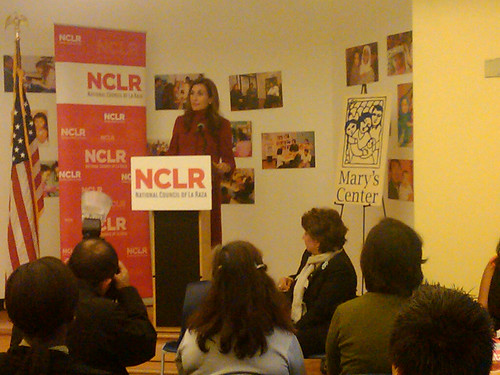As Deputy Administrator for the Supplemental Nutrition Assistance Program (SNAP), I was honored to join our partner, the National Council of La Raza (NCLR), community leaders, families and a representative from the First Lady’s Let’s Move! initiative at a press briefing to promote promising practices and policies that can help turn the tide on child hunger and obesity and improve access to nutritious foods for Hispanic children and their families. The press briefing took place the day after USDA’s release of the 2009 Household Food Security Report in the United States. NCLR’s press conference was an effort to draw attention to the fastest growing and youngest population across the United States who have difficulty putting healthy meals on the table, due to inadequate access to nutritious food. Hispanic children are among those at greatest risk for overweight and obesity and, at the same time, are the most likely to be living with hunger. Both obesity and hunger have serious implications for children’s health and well-being -- all of which are priorities of the Obama administration.
The smell of freshly cooked foods greeted us as we arrived at Mary’s Center for Maternal and Child Care in Washington, D.C. The press conference was preceded by an informal breakfast with a Mary’s Center nutritionist, families and young women, where chefs provided cooking demonstrations. The menus featured nutritious, visually appealing and delicious WIC-approved foods. I saw firsthand the critical role our Special Supplemental Nutrition Program for Women, Infants, and Children (WIC) plays in improving nutritional assistance for pregnant women and young children. The foods reflected recent changes to the food packages, making them healthier and culturally relevant to our participants.
The breakfast helped set the stage for the messages delivered by the speakers, each of whom talked about the connection between child nutrition, children’s health outcomes and future achievement. As I looked around the Center, I couldn’t help but be encouraged by the hard work and dedication of this important community partner providing such a wide range of services to the community. In other words, it’s a program that does a lot for the health of their community.
While at the Center, I had the chance to speak about the administration’s strong commitment to nutrition assistance as an essential support for low-income families. My focus was clear: the administration remains strongly committed to nutrition assistance as an essential support for families. And we know that in order to end hunger we have to improve access to our programs and remove barriers that prevent people from participating. We’ve made great strides in achieving our goal but we must continue to work on new and creative approaches to getting more Hispanic households participating in our programs.
I was reminded of the power of our programs as I listened to Brenda Alvarado’s story—a 17-year-old who had been a WIC baby and continues to participate in health and nutrition counseling programs provided at Mary’s Center. Her message about how much these programs have meant to her and her family resonated with everyone in the room. Brenda’s story epitomizes how our programs have the power to change lives.

